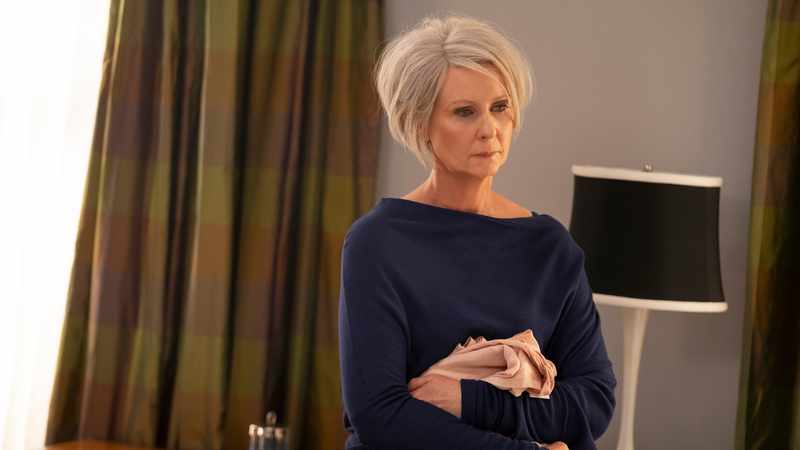
By Sonia Rao
It was once a good thing to be the Miranda Hobbes of a friends group.
The “Sex and the City” character was by far the most relatable of the bunch, pragmatic in an HBO series known for operating on a completely different scale of acceptable human behaviour.
While Samantha Jones was at least the funny one, Carrie Bradshaw and Charlotte York remained rather selfish and judgmental throughout the show’s six seasons.
Miranda had her unflattering moments, but in the end wound up a successful lawyer living in a Brooklyn brownstone with her loving husband, Steve, and their baby – a life she deserved.
But it’s also a life Miranda rejects in “And Just Like That …,” the “Sex and the City” reboot concluding its 10-episode run next week on HBO Max (M-Net channel 101 in South Africa).
The show picks up more than 15 years after the original, with Carrie (Sarah Jessica Parker), Charlotte (Kristin Davis) and Miranda (Cynthia Nixon) navigating their 50s in New York.
Miranda realises she feels stifled by her career and, increasingly, her marriage.
So she quits her job at a corporate law firm to pursue a graduate degree in human rights and eventually decides to leave Steve (David Eigenberg), too.
People’s needs evolve, and a middle-aged woman’s deep dissatisfaction with her life is a topic ripe for exploration.
Miranda asks for a divorce after experiencing a sexual awakening, sparked by her falling for Che Diaz (Sara Ramirez), a stand-up comedian – and Carrie’s podcasting boss – who is non-binary.
The premise is refreshing for a show steeped in heterosexuality. Its execution, however, has turned “being a Miranda” into an insult.

For the most part, Miranda was known to exercise careful judgment.
Her cutting remarks in the original series were often rooted in truth, delivered with a bluntness reserved for close friends who knew her heart.
Her cynicism could be better interpreted as brutal honesty, as the writer Harling Ross once argued in a blog post for the website Man Repeller.
After Charlotte insists on the existence of a single soul mate for every person, for instance, Miranda counters: “And if you don’t find him, what? You’re incomplete? That’s so dangerous.”
Miranda knew how to prioritise herself without disregarding the well-being of those in her orbit.
But in “And Just Like That …,” she not only repeatedly cheats on Steve by having sex with Che, but also betrays Che’s trust by not informing them that the two of them sleeping together constitutes an affair.
(Che’s remarkably unfunny comedy sets also function as exposition for the character, as they often joke about their distaste for “traditional,” monogamous relationships. They later assume Miranda and Steve are in an open marriage.)
All this, piled on top of Miranda somehow joining Charlotte as the clumsiest of the leads regarding matters of race.
While arguably the most progressive in “Sex and the City” – the bar is low, low, low – Miranda now reflexively expresses surprise at her Black professor’s braids and then prattles on, trying to dig herself out of the hole.
“And Just Like That …,” clearly responding to criticism of the original series’ lack of diversity, recognizes her actions as a faux pas – but somewhat excuses them as a personality quirk by failing to interrogate it further.
Miranda jokes about her trademark red hair going grey, but her bizarre behaviour is what makes her unrecognisable.
The show tries to justify it some by introducing (and quickly resolving) a drinking problem she developed during the fictional universe’s now-over pandemic, but to what end?
It’s all puzzling enough to have figured into a recent episode of “Full Frontal with Samantha Bee,” in which the host commented on how the pandemic has impacted mental health.
“Even fictional people are having a hard time coping,” Bee said.
“No one has suffered more than Miranda Hobbes.
“She is an entirely different person now. If she goes to one more ‘comedy concert,’ there’s no coming back.”
Though Miranda is justified in asking Steve for a divorce, the actual scene puts more weight behind her perception of him as a boring man – one who is vilified for losing much of his hearing along with, apparently, his sexual prowess – than it does her understandable desires to explore her sexuality and sleep with someone else.
Steve takes the news relatively well, underscoring that he just wants Miranda to be happy, after which she immediately flees to the airport to surprise Che in Cleveland, yelling to Carrie on the phone that “I’m in a rom-com!”
Messiness is to be expected of a show that, as the New Yorker critic Emily Nussbaum wrote years ago, showcased the “unacknowledged first female anti-hero on television.”
None of these women are perfect. It would be boring if they were.
But Miranda’s uncharacteristic carelessness, sometimes bordering on cruelty, robs “And Just Like That …” of the opportunity to fully explore the rush of emotions accompanying a journey of self-discovery, and the audience of the pure joy they might otherwise feel for her.
Premature rumours of a second season come off as a threat, all but demanding that viewers lobby HBO Max executives to hold their horses on this one.
That is, after all, what a Miranda would do.
